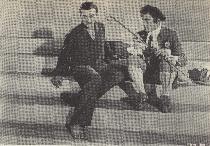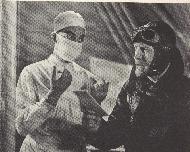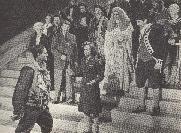From
Classics of the Foreign Film: A Pictorial Treasury
By
Parker Tyler (Canadian)
Published by
New York: Citadel Press. 1962
New York: Bonanza Books. 1962
London: Spring Books. 1962
Submitted by Richard Joly via
Richard Layne
Stairway to Heaven
or A Matter of Life and Death

|
A WAC (Kim Hunter) is very much concerned about a British pilot (David Niven)
who has dropped from his burning plane to drop into the sea. All Englishmen
are supposed to die willingly for their country; this one is behind schedule.
|

|
Marius Goring, as Conductor 71, tries to persuade the RAF pilot, suffering
from concussion, that he ought to keep his date with death. But life has
given the flyer a different idea since his crash.
|
Not unnaturally, the pilot wishes to live, if only so he can be married
to his WAC. A doctor, himself a recent casualty, is elected to argue the
pilot's cause before a heavenly tribunal.
|

|

|
Raymond massey, here an American who signed the Declaration of Independence,
supports the pilot's plea by accusing Britain of its past political injustice;
this courtroom in far space is magnificently photogenic.
|
All are here for the denoument; the pilot, the WAC, the doctor-barrister,
the American revolutionary, and the gorgeously apparelled, ineffably benign
Supreme Jidge. The trend of the case is plain enough in this most filmically
intense among Britain's fantasies.
|

|
If Renoir's Grand Illusion was a very French way of reacting to war,
with an ironic, concise moral enlightenment emerging from it's heroic trials,
the Michael Powell - Emeric Pressburger collaboration, A Matter of Life
and Death (1946), is a very English way of reacting to it; a more national
way. in fact, than the internationalism of Renoir's deep, dry draught of
grandeur and illusion; more, to be sure, an insular way. Yet, if
so, only because the individual, like England itself, had lately taken on
the aspect of a besieged island regarding matters of life and death. The
American distributors wished a more picturesque title for the work, releasing
it as Stairway to Heaven, which emphasized (as things American do)
the materialistic element of any large problem. The "Stairway to Heaven"
is a great cinematic "prop". A supernatural escalator which vanishes in
space at the top, it ushers its riders directly into Heaven while reminding
one of the enormous escalators in London's underground transportation system.
Highly photogenic, it is so grand and classical, with statues of great men
lining it, that the Other World is apt to be more memorable that the film's
stubbornly routine version of This World - undoubtedly, if chillily, the
paradox of it all.
In consonance with modern streamlined living, and the proliferant art defining
it, this Other World is a thing of dissolving vastness, its tangible surfaces
smooth and hygienically clean, "functional" and reminiscent of the way Romantic-Surrealist
artists, such as Tchelitchew and Dali, isolate their figures within empty,
retreating distances; here it seems as if human beings became denizens of
an abandoned World's Fair building meant to receive thousands every day.
The Heavenly Courtroom, indeed, has heavy traffic. Since it is wartime,
most of the souls are in uniform and of diverse nationality; their new domain
has a family resemblance to the main assembly hall at the United Nations.
Stairway to Heaven survives, like many film classics, partly because
of its prophetic nature.
This nuanced prophesy is a credit to British fantasy of the H. G. Wells
school - the most photogenic among British genres - a bright clad scion
of good humour, sweet nature, and the unfailing British trait of dignity
at whatever cost. An agreeable young military plane pilot is found in a
burning plane without a parachute. fated to fall in love with an American
WAC, who can hear him from the station on the ground, he radios her what
he thinks may be his last words; since he is a poet too, one might think
these words a vain, romantic outpouring. But that is neither the British
nor the popular way. Reaching the impressive corridors of the Other World
while undergoing surgery, after his leap into the sea, he faces the Supreme
Judge (a glorification of earthly British justice in beautiful, long wig)
and enters a plea to be allowed to remain in This World so he can be married
to the American. This "matter of life and death" then generates what some
might consider an irrelevant political quarrel - but such irrelevancy is
not the British way of settling issues.
The pilot's argument, though a bit ambitious, is both sensible and historically
pertinent; good faith between the U.S. and Britain. There's the beauty of
it, the good sense and moral fibre: the same qualities that withstood the
Blitz and may be presumed to ask for a reward. As for maundering through
Continental fantasy, grim or naughty, that would not be at all a patriotic
occupation. If airy nonsense must be talked about a matter of life and
death (including marriage), let it be, as the makers themselves describe
their film, "a stratospheric joke". This joke, I think, is more interesting
and sophisticated then a similar British predecessor, Outward Bound.
As fantastic, it cleanly repudiates the Continental flair for the grotesque
and the morbid (shades of Caligari!). If the extravagant induces laughs,
their origin must be light entertainment, Gilbert and Sullivan or Dickens;
if gasps and wonder, they should derive from Infinity and Eternity, or their
alleged vestibules. See The Time Machine in later pages and Things
to Come on previous ones.
Thus the nicest thing about Stairway to Heaven are pure British genius:
impeccable behaviour under sorest stress; regal form, regardless of caste,
in the face of just about anything; and to avoid muddling: hop to it! I
visualize this film as an oblique reproach to the avant-garde stance of
Cocteau's artist myth (recall that the pilot is a poet) in The
Blood of a Poet, where we see earthly immortality earned by the artist's
self-exhibition, his self-sacrifice and the soul-sweat clinging to his life
and works. Such "spice" is too tangy for the British palate and, to truthful,
The Blood of a Poet is not the encompassing social document it might
be. Powell and Pressburger, be it noted, made several impressive documentaries
before taking flight on this handsome, expensively staged fantasy.
The land of socialized medicine has viewed the fate of human life here,
aptly enough, as predicated on a surgeon's handiwork. As science labors
and is tried on a social level, so is the soul. Sensuously, all this is
given its logical transcendental garb; the color starts by suggesting the
diminution of the spectrum in sunless outer space, and when actually in
the Other World, goes into blue monochrome. The pilot's case is heard before
an audience of thrillingly blue men and women who have died in England's
present and previous wars; the dramatic mechanism is the surviving hostility
(originating in the American Revolution) that would keep apart an Englishman
and an American he wishes to take for his wife. Roger Manvell, the British
critic, considered the film's satiric method frivolous and its viewpoint
inconsistent. Be that as it may, his criticism seems well overridden by
the work's strong cinematic ingenuity. The use of the camera to give the
feeling that we are on the operating table, the anaesthetic mask
descending over our vision as a reddish inside-of-the-eyelid image possesses
the whole screen, is but one device making Stairway to Heaven one
of the most filmically sensitive of England's feature films, deserving
rank with the somewhat different tour de force of Dead of Night ...
Does the pilot live and get his WAC? Why not? Of course. And with indisputable
justice.
Back to index






